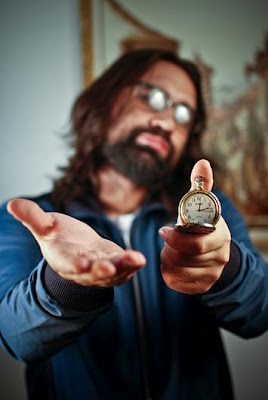by Andrea Paracchini @ Translation: Marie Jackson @25/06/12
AP: From London to Athens via Toulouse, Europe is gripped by
a sort of monetary euphoria.
JCT: Euphoria. Must mean Good News!
AP: Everyone wants to create their own currency!
JCT: They’re finding out the good news that creating their
own currency saves them all the interest.
AP: Is it a direct challenge to eurocrats? Probably. Is it a
response to the crisis? Maybe. Part one in a series of
articles on a phenomenon that transcends national borders.
JCT: An international phenomenon
We’re going to repeat the weary phrase. Will Greece End Up
Leaving The Eurozone? The coastal city of Volos, half-way
between the capital Athens and the second-largest city
Thessaloniki, is ready for any eventuality. At least, it’s
nearly ready.
Some months ago, a local exchange trading system (LETS) was
created in the port city, which has around 140,000
inhabitants. The project involves about a thousand people,
for whom time has now replaced money as a medium of
exchange.
JCT: A thousand person LETS in only a few months. Most older
LETS never got past 100 members in 10 years! Of course, they
had saboteurs helping them aim at keeping things small!
AP: For example, I can give an hour of guitar lessons to a
member of my local LETS network for an hour of service from
one of the other members. If, instead of hours of service
accumulated, I receive coupons or ‘local alternative units’
(called ‘Tems’ in Volos), I can also use these to buy goods
and services from businesses that are members of the
network. The idea is simple and user-friendly – once you
reach 1,200 Tems you have to start using them, and you can’t
owe more than 300 – and there is no more effective a system
when you find yourself pockets empty and unable to buy
anything.
JCT: There is no more effective system than LETS banking
system engineering!
AP: Cashless currency in Europe
In Greece, there have been around fifteen active or nascent
LETS networks in existence since the crisis hit and
austerity plans were introduced. Yet the country, the cradle
of modern European civilization, is not the origin of the
LETS system. It is thought that the first such system was
introduced in Canada in 1930.
Jct: No, only the idea was introduced by Quebec Social
Crediter Louis Even, he didn’t actually print what he
preached (he was taken out of the play) but Michael Linton
created the first computerized LETS freeware in 1984 and I
financed that development in DBase III!
AP: However, it was the 1990s that marked the golden age of
the LETS scheme in Europe. In Italy, the system has been
introduced in its simplest form ‘la Banca del Tempo’ (the
Bank of Time, BdT).
JCT: Keep in mind all LETS always link their currency unit
to the Hour of volunteer labor first thing.
AP: A bill which was approved in 2000 set the system within
a legal framework and encouraged communities to open these
establishments.
JCT: I didn’t know and it didn’t make the news. But if
government helped them get organized, that would explain
their success.
AP: The success of the scheme is unparalleled;
JCT: Well, they had 7 million timetrading members in the
Argentine barter networks so it’s great but not
unparalleled.
AP: the northern Italian region of Emilie-Romagna has always
been one of Italy’s most prosperous areas, yet during the
financial crisis, banks of time could take centre-stage.
JCT: It always takes a crisis for people to turn to the only
true alternative. But as soon as the loansharks open their
doors for loans again, they usually go back in debt.
AP: This is precisely what is happening in Spain, where LETS
schemes have become something of a national obsession.
JCT: Yes, they’ve finally found out about LETS in Spain and
the doers have really been doing.
AP: A blog called vivir sin empleo (‘live without
employment) has mapped out LETS networks throughout the
country: around 300 are thought to exist in Spain already,
with more networks being created every day.
http://www.theatlanticcities.com/jobs-and-economy/2012/09/time-currency-spains-cities/3262/
has a list of over 300 new timebanks I didn’t know about!
AP: How does the ‘Banca del Tempo’ work in Italy?
Whilst bartering, trade and mutual aid seem particularly
adapted to the social structures along the circumference of
the Mediterranean, however, the bulk of the LETS scheme’s
supporters tend to live north of the Alps.
In France, there are around 500 LETS networks (Sel), some
very active with hundreds of members, whilst others lie
dormant. Since the start of the 2011 academic year, two so-
called ‘accorderies’ have opened in Paris and Chambery in
south-eastern France. Born of a French-Canadian spin on the
LETS scheme, these ‘accorderies’ have been created with an
aim to help those living in working-class areas.
Finally, in Austria, the ‘Tauschkreis’ is benefiting from
official recognition from governing institutions in the
western region of Vorarlberg. According to Rolf Schilling,
the Tauschkreis project leader, 2,000 people trade 30,000
hours via the Tauschkreis each year. Most importantly,
‘Talents’ – the Austrian LETS scheme coupons – are accepted
by 130 businesses in the region, as well as by a number of
local collectives, thus making it possible to pay up to 75%
of local taxes in local currency.
JCT: They can be used to pay taxes and there are only 2,000
members? That’s the holy grail of community currency
credibility.
AP: In the north, making our own money
In northern European countries, these alternative currencies
have freed themselves from systems built on bartering and/or
mutual aid. They’ve become far more sophisticated; within a
community, it is possible to exchange your euros against a
so-called ‘complementary currency’ (in the form of notes or
credits on an electronic card) which you can use to make
purchases. The primary aim is to keep wealth within the
district concerned; when you buy something at a supermarket
chain, your money usually leaves your community and ends up
profiting the company’s shareholders at the end of the year
instead of local traders.
As such, the target of these new local currencies is not so
much the euro as it is the functioning of the economy in its
entirety.
JCT: So the target isn’t the Euro, it’s fixing the economy
in its entirety which will happen when all these LETS unite
into a global UNILETS network.
AP: Some, for example, advocate a veritable deontology: only
those companies respecting the obligations of a charter (for
instance, the sale of organic and/ or fair trade produce)
are able to join the LETS network. This is often the case
for complementary currencies in the United Kingdom (and now,
by extension, throughout all of Europe), which operates
under the auspices of the so-called ‘transition towns’
initiative.
JCT: How people use their credits is sticking the cashier’s
nose into none of our business. But this kind of control is
only possible with a centralized network, the control freaks
can’t handle physical tokens, they can only control online
trades.
AP: With 70,000 BL in circulation and a ‘pay-by-text’
system tested by 400 subscribers, you are most likely to see
these notes being exchanged in cafes and restaurants, thus
drawing accusations that the Brixton pound is a currency for
‘champagne socialists’.
JCT: First it’s not a time-based LETS, it’s a weaker cash-
based token. And sure it’s a dinky toy. But it’s not the
cash-based model that’s the phenomenon among people with no
cash, it’s the time-based model that’s the phenomenon among
people with plenty of spare time.
AP: On the continent, it’s Germany that holds the record for
alternative currency in circulation, with the equivalent of
900,000 euros available in various local monies. The
leading German example is the Chiemgauer, a currency
exchanged by some 3,000 consumers in 600 businesses in
Southern Bavaria.
JCT: Another weaker cash-based dinky toy.
AP: These are impressive figures, to be sure, but it’s hard
to imagine the leaders of the European central bank worrying
about the breakthrough of alternative currencies.
JCT: No kidding, I’d think they’d be terrified thinking that
every LETS transaction has cost them their interest on loans
for currency we would have had to borrow to use in the old
days.
AP: What’s more, no European government seems able to take
these initiatives seriously.
JCT: Yes, bankster toadies in government seem unable to take
the system that’s costing their masters their vigorish very
seriously! Har har har. Their loanshark system is being
supplanted by LETS interest-free timebanking and there’s
nothing they can do about it!







